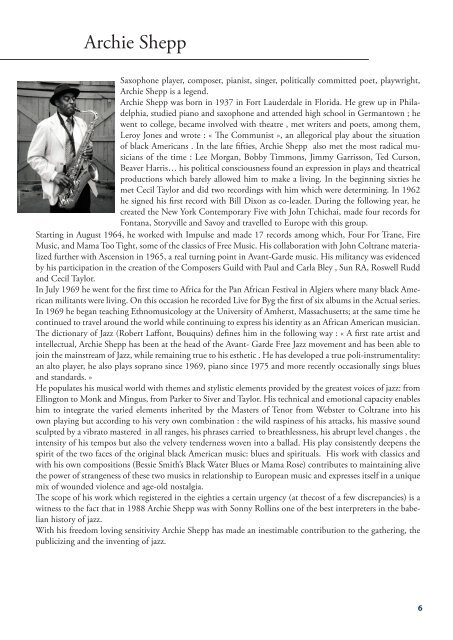Attica Blues Big Band, the project - Planete-Aurora
Attica Blues Big Band, the project - Planete-Aurora
Attica Blues Big Band, the project - Planete-Aurora
Create successful ePaper yourself
Turn your PDF publications into a flip-book with our unique Google optimized e-Paper software.
Archie Shepp<br />
Saxophone player, composer, pianist, singer, politically committed poet, playwright,<br />
Archie Shepp is a legend.<br />
Archie Shepp was born in 1937 in Fort Lauderdale in Florida. He grew up in Philadelphia,<br />
studied piano and saxophone and attended high school in Germantown ; he<br />
went to college, became involved with <strong>the</strong>atre , met writers and poets, among <strong>the</strong>m,<br />
Leroy Jones and wrote : « The Communist », an allegorical play about <strong>the</strong> situation<br />
of black Americans . In <strong>the</strong> late fifties, Archie Shepp also met <strong>the</strong> most radical musicians<br />
of <strong>the</strong> time : Lee Morgan, Bobby Timmons, Jimmy Garrisson, Ted Curson,<br />
Beaver Harris… his political consciousness found an expression in plays and <strong>the</strong>atrical<br />
productions which barely allowed him to make a living. In <strong>the</strong> beginning sixties he<br />
met Cecil Taylor and did two recordings with him which were determining. In 1962<br />
he signed his first record with Bill Dixon as co-leader. During <strong>the</strong> following year, he<br />
created <strong>the</strong> New York Contemporary Five with John Tchichai, made four records for<br />
Fontana, Storyville and Savoy and travelled to Europe with this group.<br />
Starting in August 1964, he worked with Impulse and made 17 records among which, Four For Trane, Fire<br />
Music, and Mama Too Tight, some of <strong>the</strong> classics of Free Music. His collaboration with John Coltrane materialized<br />
fur<strong>the</strong>r with Ascension in 1965, a real turning point in Avant-Garde music. His militancy was evidenced<br />
by his participation in <strong>the</strong> creation of <strong>the</strong> Composers Guild with Paul and Carla Bley , Sun RA, Roswell Rudd<br />
and Cecil Taylor.<br />
In July 1969 he went for <strong>the</strong> first time to Africa for <strong>the</strong> Pan African Festival in Algiers where many black American<br />
militants were living. On this occasion he recorded Live for Byg <strong>the</strong> first of six albums in <strong>the</strong> Actual series.<br />
In 1969 he began teaching Ethnomusicology at <strong>the</strong> University of Amherst, Massachusetts; at <strong>the</strong> same time he<br />
continued to travel around <strong>the</strong> world while continuing to express his identity as an African American musician.<br />
The dictionary of Jazz (Robert Laffont, Bouquins) defines him in <strong>the</strong> following way : « A first rate artist and<br />
intellectual, Archie Shepp has been at <strong>the</strong> head of <strong>the</strong> Avant- Garde Free Jazz movement and has been able to<br />
join <strong>the</strong> mainstream of Jazz, while remaining true to his es<strong>the</strong>tic . He has developed a true poli-instrumentality:<br />
an alto player, he also plays soprano since 1969, piano since 1975 and more recently occasionally sings blues<br />
and standards. »<br />
He populates his musical world with <strong>the</strong>mes and stylistic elements provided by <strong>the</strong> greatest voices of jazz: from<br />
Ellington to Monk and Mingus, from Parker to Siver and Taylor. His technical and emotional capacity enables<br />
him to integrate <strong>the</strong> varied elements inherited by <strong>the</strong> Masters of Tenor from Webster to Coltrane into his<br />
own playing but according to his very own combination : <strong>the</strong> wild raspiness of his attacks, his massive sound<br />
sculpted by a vibrato mastered in all ranges, his phrases carried to breathlessness, his abrupt level changes , <strong>the</strong><br />
intensity of his tempos but also <strong>the</strong> velvety tenderness woven into a ballad. His play consistently deepens <strong>the</strong><br />
spirit of <strong>the</strong> two faces of <strong>the</strong> original black American music: blues and spirituals. His work with classics and<br />
with his own compositions (Bessie Smith’s Black Water <strong>Blues</strong> or Mama Rose) contributes to maintaining alive<br />
<strong>the</strong> power of strangeness of <strong>the</strong>se two musics in relationship to European music and expresses itself in a unique<br />
mix of wounded violence and age-old nostalgia.<br />
The scope of his work which registered in <strong>the</strong> eighties a certain urgency (at <strong>the</strong>cost of a few discrepancies) is a<br />
witness to <strong>the</strong> fact that in 1988 Archie Shepp was with Sonny Rollins one of <strong>the</strong> best interpreters in <strong>the</strong> babelian<br />
history of jazz.<br />
With his freedom loving sensitivity Archie Shepp has made an inestimable contribution to <strong>the</strong> ga<strong>the</strong>ring, <strong>the</strong><br />
publicizing and <strong>the</strong> inventing of jazz.<br />
6


